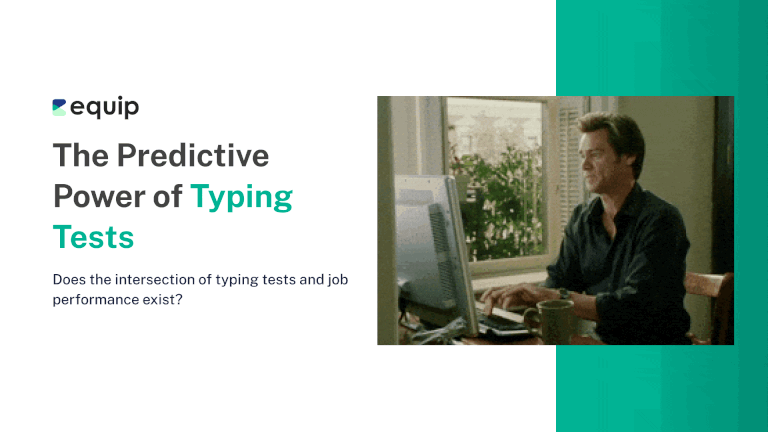
Tests are a common aspect of the recruitment process for a wide range of positions. Whether a candidate is interviewing for a customer service role or a company secretary, it’s reasonable to expect a test that measures a candidate’s skills and abilities. This is especially true for typing tests, which are often administered during the recruitment process for positions that demand extensive keyboard work, like data entry or administrative roles.
These tests are designed to showcase the applicants’ strengths and assess their suitability for the role, but do these tests actually predict how well someone will perform on the job?
In this article, we’ll dive into the debate on whether typing tests are truly effective at forecasting job success, examining why some see them as reliable indicators and others question their value.
Understanding Typing Tests
What Are Typing Tests?
Typing tests have their roots in the early 20th century, coinciding with the rise of typewriters in business settings. The first typing tests were designed to evaluate the efficiency of typists, focusing on metrics such as speed and accuracy. These tests were initially conducted using mechanical typewriters and were an essential tool for assessing the skills of clerical staff in administrative roles. Over time, the advent of electronic typewriters and personal computers shifted the landscape, prompting the development of more sophisticated and accessible typing assessments.
One significant milestone in the evolution of typing tests came with the introduction of Mavis Beacon Teaches Typing in 1987. Developed by The Software MacKiev Company, this educational software revolutionized the way typing skills were taught and assessed. Mavis Beacon’s engaging lessons and games were designed to improve typing speed and accuracy through interactive practice. Its impact was profound, as it not only made typing training more accessible to a broader audience but also introduced a new standard for evaluating typing proficiency. The software’s influence extended beyond educational settings into professional environments, shaping how typing skills were measured and helping to solidify the importance of typing tests in recruitment and job performance assessments.
Today, typing tests are standardized assessments that measure a candidate's typing speed and accuracy, critical skills for roles that require extensive keyboarding. The tests are categorized primarily into:
- Speed Tests: Evaluating how quickly a candidate can type a passage.
- Accuracy Tests: Measuring the precision of typing, often with penalties for errors.
Try taking a typing speed test demo on Equip for fun. You can add these tests to your assessment too.
How Typing Tests Are Administered
Typing tests can be conducted through two commonly used formats:
- Online Platforms: Digital typing tests are popular due to their convenience and easy integration into online applications.
- In-Person Assessments: Some employers prefer in-person tests to ensure a controlled environment and prevent cheating.
These tests are used to evaluate whether candidates possess the necessary typing skills for roles where these skills are essential.
Typing Tests as Predictors of Job Performance
Research consistently shows a positive correlation between high typing speed and accuracy and improved job performance in positions where typing is a core responsibility. For example, studies conducted by Digital Edge have found that data entry clerks with strong typing test results tend to exhibit better performance metrics in their jobs. However, while typing tests effectively gauge proficiency in these roles, they do not provide a comprehensive assessment of a candidate's overall job performance.
Several factors can influence the outcomes of typing tests, such as test anxiety and environmental distractions, which can affect an individual’s typing speed and accuracy. These factors may lead to unreliable assessments, limiting the predictive value of typing tests when used in isolation.
Which Industries Rely on Typing Tests?
Many companies and industries incorporate typing tests into their recruitment processes to assess candidates’ basic typing skills, particularly for roles where these skills are critical. For example:
- Data Entry Companies often use typing tests to evaluate candidates' ability to handle large volumes of data accurately.
- Administrative Departments frequently employ typing tests to assess candidates' efficiency in handling documentation and communication tasks.
- Customer Service Centers may use typing tests to ensure that candidates can manage real-time data entry while communicating with customers.
- Legal and Medical Transcription Services use typing tests to assess candidates’ speed and accuracy in transcribing important documents.
- Software Companies incorporate typing tests for roles that require fast and accurate input of code or data.
The Limitations of Typing Tests
While these industries find typing tests useful, organizations like the Society for Human Resource Management recommend combining them with other assessment methods, such as interviews, cognitive ability tests, and personality assessments, to ensure a more comprehensive evaluation of a candidate's suitability for the role.
This is because typing tests— while effective at measuring a candidate's speed and accuracy with keyboard tasks— fall short in evaluating critical soft skills that are essential for job success. For instance, communication skills—both written and verbal—are vital in roles that require collaboration, customer interaction, or detailed documentation, yet these cannot be adequately assessed through typing alone.
We recommend combining multiple skills in a single assessment on Equip. For instance, an assessment for a customer service role can include tests to evaluate communication, typing and aptitude skills.
Similarly, problem-solving abilities, which involve analyzing information, developing solutions, and thinking creatively under pressure, are not reflected in a candidate's typing test results. Emotional intelligence, which encompasses empathy, self-awareness, and interpersonal skills, is another key attribute that typing tests fail to measure. These competencies are crucial in fostering a positive workplace environment, managing conflicts, and leading teams effectively. Therefore, relying solely on typing tests can provide an incomplete picture of a candidate’s potential, underscoring the need for a more holistic approach to assessment that includes evaluations of both technical and interpersonal skills.
It’s also important to be aware that— along with their limitations in assessing soft skills— advances in technology may pose new challenges for the reliability of typing tests. For example, AI-driven note-taking apps and voice- search dictation, are increasingly influencing the relevance and effectiveness of typing tests in the hiring process. As these technologies become more sophisticated, they enable individuals to perform tasks traditionally reliant on typing skills more efficiently, reducing the emphasis on fast typing as a critical job requirement.
For example, AI note-taking applications can transcribe spoken words into text almost instantly, while voice search tools allow users to input data or search queries without needing to type at all. As these tools are more widely accepted in the workplace, the necessity of high typing speed and accuracy may diminish for certain roles, prompting employers to reconsider the value they place on typing tests during recruitment. Instead, the focus may shift toward evaluating a candidate's ability to effectively use these emerging technologies, integrating them with traditional typing assessments to ensure a comprehensive evaluation of digital proficiency.
Are Typing Tests the Right Test Type for You?

Typing tests are valuable tools for assessing candidates’ digital skills, especially for roles where typing is central to job performance. However, their predictive power is limited when used in isolation. To optimize hiring practices, it’s important to combine typing tests with other assessment methods that evaluate soft skills, problem-solving abilities, and other relevant attributes. This integrated approach will enhance the overall hiring process and provide a fuller picture of a candidate's potential.
More on Test Types: How HRs can use Big Five Personality (OCEAN) Tests for Hiring
